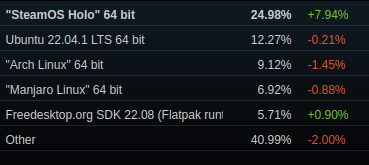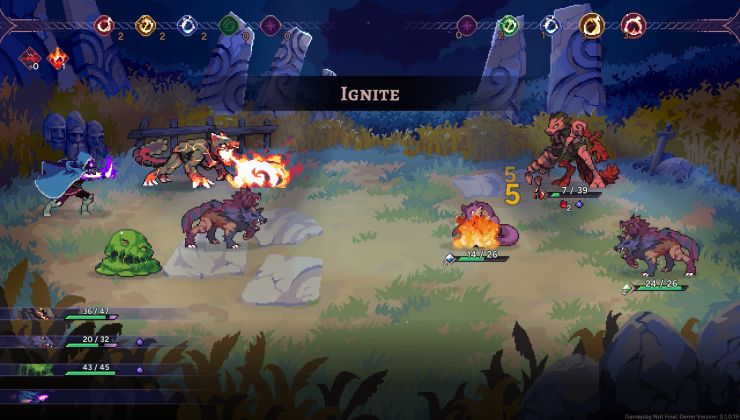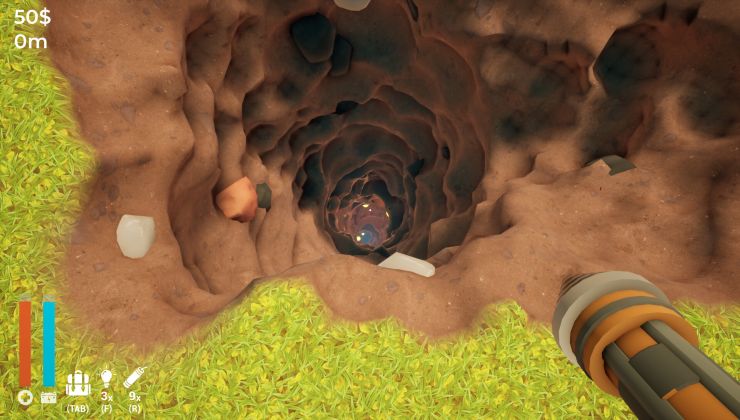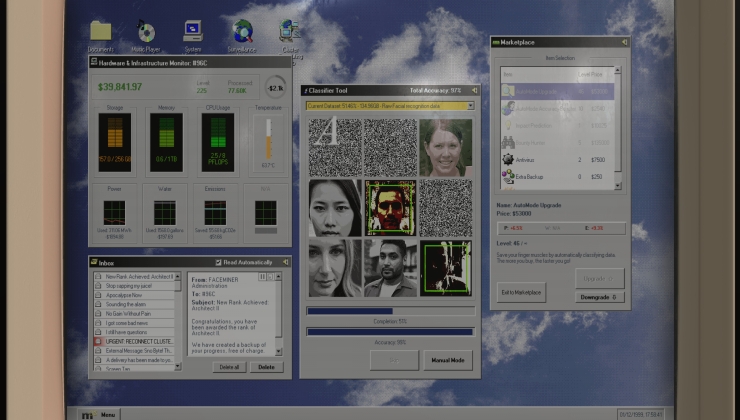Back in 2020 I pointed out what were the best Linux distributions for gaming, so here's the current state and what you should go for in 2023.
The thing is: not a lot has changed since my last article. Linux is still a minefield of many different distributions for people, and it can be very confusing. There's a lot of articles out there recommending really random and outdated distributions in lists too, so here's the real thing.
Without getting bogged down into packaging issues, and just giving you the basics of "this will work just fine" — go and install Ubuntu. People will (and I expect them to) argue for others, and people are free to, but a lot of people suggest other distributions for the wrong reasons. Manjaro has too many problems both technical and management, Arch can and will break things if you don't know exactly what you're doing, Fedora is messy with NVIDIA drivers and SELinux on Fedora is a nuisance and so on. Ubuntu is still to this day, the most simple distribution of Linux to install and get gaming.
Ubuntu isn't perfect by a long shot, but it remains as my number 1 choice to suggest to people both new and old to get into Linux and get gaming. It's one of the most used on desktop by any statistic you can find, which also means troubleshooting it is generally easier too.
With the Ubuntu LTS (long term support) releases, you also get support for at least 5 years, so you don't have the hassle and potential breakage of major system internal updates for quite a long time.
Valve's own stats show Ubuntu as one of the most popular too and it has been the same since Steam came to Linux.
As a user of Fedora myself, take it from me if you're in any way new to Linux: just go with Ubuntu. If you ever decide you "really know Linux now", then you can think about using something else. Don't make it difficult for yourself.
How might this change in future?
Well, Valve are here with the Steam Deck and SteamOS. Eventually, Valve will release SteamOS 3 so anyone can download it and install it. That might end up being a good pick, but right now it's not on the table as it's not released and anyone making their own version of it (like HoloISO and others) are too small to recommend serious use of them.
If you need help and support, specifically for Linux and also Steam Deck gaming, you can try asking in our Forum, Discord, IRC and Telegram.
I used to be on Ubuntu, but for the last 5 years or so, i’m on Manjaro, and i find it very enough for everything, and i’ve had less issues overall.
But... That may simply be because Linux itself is improving, and maybe if i was on Ubuntu my feeling would be the same : less and less issues.
'Whatever you're already using and happy/comfortable with' - but that only really holds true if you're talking about managed things like Steam and Lutris that do the vast majority of the heavy lifting for you (e.g the Steam Runtime based off of Ubuntu that everything seems to run against).
There are some really annoying things about Ubuntu for totally new-to-Linux users. Most people have interacted with Windows machines or Macs, and Gnome 3 might be a little hard to adjust to for them; my recommendation there would be the Kubuntu or Xubuntu spins (defaulting to KDE Plasma and Xfce respectively) for a more 'familiar' default UI. (And of course you can add and change that from any starting point; no need to reinstall because you want to use something different.)
The situation with snaps is also frustrating once you start getting into things, but *most* new users shouldn't be raging at Canonical just yet. If you've learned enough to start hating snaps (and systemd... and Pulseaudio...) and start hunting for alternatives without them, congrats! You're not the target audience for this article any more. ;p
Once you dive into the rabbit hole of non-Steam ports, though, yeah - the Ubuntu repos are pretty good. PPAs fill the gap beyond that in the same way the AUR does for Arch (& derivatives). You may appreciate a lot of software being built as and offering .deb files to install, too.
Ubuntu's not necessarily the 'best' distro, the most open, etc., but it's definitely got a lock on 'good enough to get started with'.
Just... be prepared to want to switch in a couple years as you learn and grow. :)
But I agree with you, Ubuntu is a safer choice as it simply work.
And Steam Snap sounds interesting, looks like it has lower performance currently, but if they manage to make it on par, it'll be great as it will use the "Oibaf" Mesa, while the OS can stay on stable version.
Or Linux Mint, which is kind of like Ubuntu but with a sane DesktopThis!
If your an amd user then I feel there are more option as you can totally avoid closed source drivers.
... for a bit of off-topic fun, though -- regarding selinux, have you guys seen this? https://developers.redhat.com/e-books/selinux-coloring-book
It's a cheeky little book that covers the basics of labelling in selinux, as if to say, 'stop complaining; it's so simple it can be described in a coloring book'. Which is true -- though it's no surprise that with proper documentation, the 'basics' should be easy to get. What can get difficult isn't even diagnosing the little errors that can creep up in desktop use (the diagnosis tools are pretty good); it's deciding how to resolve them (do I set an ad hoc policy? adjust a system wide boolean? is it ok if I allow this process access to this port/socket/whatever, or should I stick with the officially sanctioned ones?).
Though I personally recommend Fedora KDE and OpenSUSE Tumbleweed to friends who want to try a Linux distro, and most of them enjoy one of those
BUT - its my day to day job, so when I get home and want to play a game, I dont want to fix shit. I want to play! So, I have to agree - Ubuntu and its off-shots seem to be the most solid choice as they are the most visible and get the most support.
Case in point - my Valve Index runs WITHOUT issue on Ubuntu and its spins... But I have nothing but issues on Arch and its spins... So, when I want hassle free playing (More or less), I go with Pop_OS. Ubuntu is fine, but I just like System 76, so use that.
Anyway, my 2 cents - hope you dont want a refund :-D.
- I find it more stable
- easy to find support on their forum in english and french
- rolling release
- better packages dependencies rules, for example, when you install wine, it installs everything you need and suggestions are pertinent
Last edited by legluondunet on 2 Dec 2022 at 9:08 am UTC
The default configuration may work ok, but Ubuntu never seems to work right when you try to change the configuration. Try to switch to window manager, it breaks GDM somehow. Install lightdm with apt, of course it's broken on install and has to be fixed to be useful.
Even the idea that there is tons of information on ubuntu because it's so widely used doesn't seem to actually pan out. As far as I know there is nothing even close to as comprehensive as the Arch wiki, and the ubuntu wiki frequently seems badly out of date.
So, yes, Ubuntu may work well if you intend to install it, play games and never do anything else, but for day-to-day use I'm not at all happy with where it is right now.
(Really the only thing I don't like is the very intrusive push to snaps, otherwise Ubuntu LTS is close to perfect for focusing on getting things done)
Last edited by jens on 1 Dec 2022 at 5:36 pm UTC
I love Gnome so this is also a big factor.
Anyway, Manjaro is wonderful too but I do prefer the aesthetics of Ubuntu.
Otherwise, I have to say this, just about any distro is good to use these days so I really don't see a lot of differences between them in a sense that one plays nicer with games than another.
Also started to love snaps and flatpaks in the meantime. Linux is just..well, the best desktop OS there is.
I say this as an Arch user.
Mint is the only distro I'd recommend to brand new Linux gamers.
Ubuntu is pretty solid, but I have always had niggling issues here and there that people tend to attribute as part of the Linux experience, with virtually every Ubuntu release. Canonical tends to not have a great attitude with minor package or w/e issues, and if they fix it, it'll be in the next version -- where you get new minor issues, rinse, and repeat. Minor annoyances can really put people off if they're new to Linux.
Except it's not really part of the Linux experience. Mint polishes that not-quite-a-turd, I could count the issues like that on one hand that I've had with Mint over the years, and it's quite a few years at this point.
Also, on a different point, I will never understand why some people recommend Mint as a beginner distribution, which is a weird stigma to create. It gives the idea that it's meant just for beginners, but why does a distribution have to be hard, or work, heavily customized, or simply more difficult? It's totally fine if that's your thing of course, but there is no justification for it beyond personal preference typically.
Last edited by dibz on 1 Dec 2022 at 6:13 pm UTC
My pre-click instinct told me the answer could be SteamOS as it's the heavy hitter and is the obvious one lifting us up as a serious platform.
I really hope Fedora closes the gap, they are doing a Raspberry Pi release, but I think some of their strict adherence to FOSS and making it harder to get mp3 codecs and other "absolutely proprietary" stuff do cost them the lead.
Its hard for me to get behind Canonical when I feel www.killedbygoogle.com style vibes -- but hell, for the ultranoob they're hard to beat as they hit all the marks for that demographic.
Edit: I think GOL and other Linux sites need to supplant top Google search results for "Best Gaming Distros" -- these nobodies who could get no shits about linux get to fill the internet with their spam and bad advice -- we should have a coordinated effort to supplant them to protect noobs from their idiocy.
Last edited by ElectricPrism on 1 Dec 2022 at 6:33 pm UTC
















 How to set, change and reset your SteamOS / Steam Deck desktop sudo password
How to set, change and reset your SteamOS / Steam Deck desktop sudo password How to set up Decky Loader on Steam Deck / SteamOS for easy plugins
How to set up Decky Loader on Steam Deck / SteamOS for easy plugins
See more from me